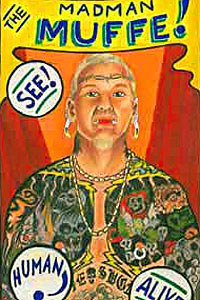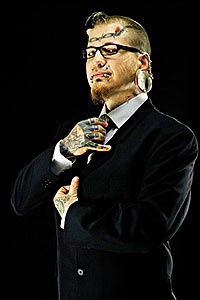FAKIR VS. STELARC, THE LISBON FACE-OFF
I was delighted that Shannon was able to catch up with the elusive Stelarc recently at the TransVision 2004 Conference. I was even more thrilled that he was able to make a video interview, and further, that Stelarc remembered our televised Festival Atlantico confrontation in 1997. You see, I had long been a rabid Stelarc fan since I first saw his 1985 book “Obsolete Body Suspensions”. I had tried in vain to contact him first in Japan and later in Australia. I never got a reply to the many questions I had about the “whys” and “wherefores” of his suspensions. To me, they were imaginative and an extreme visual turn-on. And since I had already done a number of my own suspensions (including several O-Kee-Pa’s), I felt his must have taken him somewhere in the unseen worlds. But he never mentioned this in any of his books, films, or writings.
So we were both booked to perform in Lisbon. Now he could not avoid me! The first time we met face-to-face in the festival gallery, Stelarc was charming, funny, and highly respectful of “Fakir”. He had also heard of me. I was in awe of him and he seemed to be in awe of me. The festival director arranged for a lengthy television interview and debate, in English, for the European TV networks. Now I had my chance, on public media, to ask all those old questions!
Well, he dodged and danced claiming all his suspensions were merely “works of art” and did not go to any erotic or esoteric turf. No masochism. No “unseen worlds”. He said they were only one step in his attempt to explore and improve what he thought was a poorly designed machine. His goal was to become a “Cyberman”, part flesh and part machine. A scientifically improved body. On the other hand, I told him that for me body suspensions were part of a greater ritual that allowed me to bridge the gap between spirit and body — and that for me body was already a great and marvelous creation. I suggested that in his suspensions he may have been at the door to “unseen worlds” but perhaps was afraid to go through. He didn’t seem to like that suggestion! So we parted in total disagreement, but friends. If you would like the full story of our confrontation, go to my site and order a copy of BODY PLAY #16.
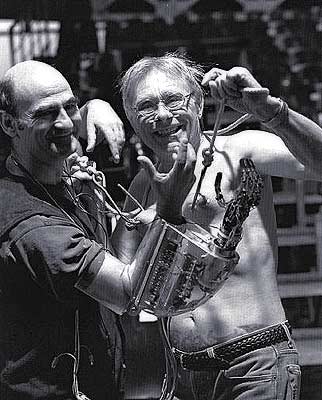
Stelarc (Mr. Cyberman) and Fakir (Mr. Organic) as they faced-off in Lisbon.
SHAMANIC SUSPENSION RETREAT
This summer I took a ten-day vacation in the magnificent Northern California mountains between the coastal valleys and Pacific Ocean. Luckily, I have a piercing and suspension loving friend who owns 200 acres of isolated prime wilderness there. On this land’s hilltop, in absolute stillness except for nature’s birds and breezes, I had a vision: devotees swinging in the twisted branches of an indigenous oak forest. What an exceptional place for unhurried shamanic rituals, rituals for those who want an organic suspension experience. The vibes of this California hilltop equaled or exceeded any of the traditional ritual locations I have visited in Wyoming, South Dakota, or Southeast Asia. And it is only a three-hour drive from San Francisco! Better yet, it is only a few miles from my favorite hot springs spa which is also owned by friends. My mind started churning.
Over the next few days I scouted the location, asked questions and found that the nearby hot springs had just built an isolated group building to house fourteen to twenty people. It has a private kitchen, dining area, bath and community space used primarily for tantra and yoga classes. Wow! What a great combination this would be for an exclusive Shamanic Suspension Retreat in the summer of 2005. Now, dear adventure seeking friends, those who have expressed a desire for a more organic and nature-driven suspension, would you be interested in participating in such a retreat? Numbers would be limited. The retreat could be anywhere from two to four days. Devotees could participate in teams of three or four. Everyone gets a turn. Shamanic and medical guidance would be available, including the energy of Fakir and several other skilled psychic and physical guides.
If you long for this type of experience, please write me a private email. I have been in touch with a number of you since my last column, especially those few of you who have tried a true O-Kee-Pa style suspension from two chest piercings. Some of you have had mechanical difficulties with it. From your pictures, I have spotted a few problems, chief of which are:
- Chest piercings too high on the chest, too superficial, and in a place where the skin is very thin and not strong enough to bear your weight. Remember, if you weigh 160 pounds, each piercing must bear 80 pounds!
- Piercings not made exactly across the grain of the skin which causes ripping, bleeding, and the entrance of air pockets into the skin as it separates from the extreme weight it must bear.
- Not enough deep tissue in the piercings (lack of enough tissue volume again causes ripping and air pockets). Please note, bigger hooks or other hardware does not compensate for lack of strength in long superficial piercings in the upper chest. My advice: lower the piercings into the breast area where the grain of the skin is more horizontal and you can get a substantial amount of subcutaneous tissue in the piercings by piercing more vertically. See pictures of my O-Kee-Pa suspensions as a guide.
I’ve also been studying lots of BME pictures of horizontal suspensions (some people call them “Coma” and “Superman”). Again, from my own experiences I see several mechanical problems that can create disruptive and unpleasant sensations that interfere with trancing or prolonged suspension. These are:
- Too few hooks and hook location that does not allow uniform distribution of body weight. I try to plan hook location so each hook bears about the same amount of weight (between five and seven pounds).
- Not enough hooks located over the heaviest sections of the body. For example: over the hips, buttocks and upper thighs and over the upper chest. I suppose modesty is preventing some of you from placing hooks in strategic supportive positions. Yes? Forget modesty. Take some cloths off!
- Suspension cords or ropes with lack of “spring” or elasticity that makes your lift-offs very quick, sharp and painful. I find that bungie cord loops permit a gentle lift-off that is easier to adjust to. The worst thing I ever did was try a Sun Dance with steel cables that had no stretch. Not fun.
 |
 |
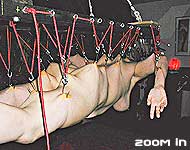 |
Indigenous oak forest in Northern California coastal mountains.
|
Group lodge at hot springs spa nearby the oak suspension forest.
|
Horizontal hook suspension with bungie cords (click to zoom).
|
SWIMMING WITH DOLPHINS
A Spiritual Suspension in Austin Texas (Reprinted from BODYPLAY #16)
Experience text by Beth Basar
Photographs by Dan McCollum
Long after my return from Lisbon in 1997, I received a letter from my dear shaman friend Bear in Austin, Texas. He told me he had been continuing his practice of facilitating body suspensions for those who sincerely desired the experience of journeying to unseen worlds and inner space. He wrote that he had just completed just such a journey, an outdoors shamanic suspension, with a young woman, Beth Basar.
The whole event was beautifully photographed by Dan McCollum. And even better, afterwards Beth had written about the journey and her subsequent feelings. I have long cherished this account and photographic documentation. It stands out as a prime example of what is available to us if we go about a suspension with integrity and clear intent. Bear, Beth, her husband, and Dan McCollum were kind enough to offer to share this magical event with those who wanted to know more about a spiritually-oriented suspension. In her own words, here is Beth’s account:
Dolphin Journey
On August 16, I was involved in an outdoor suspension. It was the most incredible journey of my life and this is my story. I had read about suspensions before and had been intrigued by them. Almost a year ago I had the exciting opportunity to actually see a suspension for the first time. Ever since then I knew it was something I would one day do.
It was a perfect night for an outdoor suspension, warm with a gentle breeze and almost full moon. The suspension took place in my backyard on a beautiful old oak tree. It was lit with artificial lighting so everyone involved in the suspension could see what they were doing and so photographs could be taken. Before the suspension everyone present, including myself, was smudged with a sage smudge stick to purify all energies present and take away all negative energies. The oak tree from which I was to be suspended from was also smudged and blessed.
Bear, my guide and piercer, and his assistants were wonderful to me. They would tell me step-by-step what they were doing and why, so that I would not be surprised. After cleansing my body and marking it with ink to show where the piercings would go, they began piercing me, the first step on the way to my journey. One person on each side of me, piercing in tandem.
Once all 20 hooks were in and the clips were in place, they started threading cords through the clips and started tightening them. The first time they lowered the gurney from under me, I felt light-headed as if I were about to pass out. Bear raised the gurney under me again and loosened all of the cords. He then asked me if I wished to continue. I said yes. He started tightening the cords again at a little bit slower pace, letting me get used to the pressure and tightness before tightening them more. Then the moment came to lower the gurney again, little-by-little until I was free from the gurney and suspended only by the cords on the tree and the hooks in my body.
What an incredible feeling, the energy from all my friends watching was enormous. I felt so free and at peace. I would just close my eyes, listen to the music and fly. The breeze would gently sway my back and forth which would heighten all of my sensations.
I felt someone put their hands on mine. I opened my eyes and there kneeling in front of me was my husband George with tears streaming down his face. George knew that being suspended was something I wanted to do for a long time, and I knew it brought joy to him knowing I was doing something I had dreamed of doing for a year now. He sat there for a few moments, told me he loved me and told me to have a wonderful journey; and what a wonderful journey I did have!
One part of my journey led me to swimming with two dolphins, one on each side of me. I should actually say flying with dolphins for there was no water around us. But I could hear water running, like a waterfall somewhere near us, but could not see it. Every so often, Bear would gently sway me back and forth. This was such a surreal feeling it would take me further along my path.
While on my dolphin journey, my “big brother” Sam came up and gently touched my side and told me how beautiful I was and that I was flying with the Gods. My journey with dolphins may be due to receiving two gifts involving dolphins from two separate people right before the suspension. One was a bracelet with a dolphin on it and the other was a dolphin pendant both of which I wore during the suspension. Neither person giving me the gift knew anything of the other person giving me a gift involving a dolphin. So was it coincidence or fate that I should swim with dolphins? I have no idea how long I was on what I call the dolphin journey. I just know it was an amazing journey. During the suspension I had absolutely no concept of time.
After returning from my dolphin journey I returned to my physical plane and opened my eyes. Sitting on the ground in front of me were my two guardians, my husband and my “big brother” Sam. They were both sitting there holding each other looking over me. I motioned for them both to come closer to me. They did, each taking one of my hands. I looked at them and told them what a beautiful experience I was having and how glad I was that I was suspended outside. We all three started shedding tears. For me it was both tears of sadness and joy. There were tears of sadness because I wanted so much for both of them to feel and experience the happiness I was feeling. Yet there were tears of joy because the two men I cared about most were there to witness and support me as I continued my journey. I can’t say if their tears were tears of joy or sadness. Based on the energy being given off, which was very powerful, I would say they were tears of joy. We all three stayed there, connected to each other — smiling, laughing and crying. After they both went back to sit down, I continued my journey.
I closed my eyes, concentrated on the music (playing in the background) and let whatever was going to happen next happen. My next path took me further away into the land of the beyond. I felt I was flying with the Gods. Even through I was in a place far away in an unknown and unfamiliar land, I never felt afraid or worried. Instead, I felt very much at peace and free from all worries. It felt as if there was a protective orb surrounding me; it was very spiritual for me.
When I would open my eyes I would see the ground and it seemed many miles below me. But in reality was only a few feet below me. It was unbelievable, as if I were many miles away looking down on myself and everyone around me. Again I closed my eyes and continued my journey with the Gods. I eventually returned to earth for a bit, and before continuing the journey, all lights used to light the scene were turned off and it was only moon light shinning through the old oak illuminating the ground around me. Once again I closed my eyes and started flying, not as high this time but just as wonderful. With only the moon light caressing the ground, everything seemed more powerful. I was one with all my surroundings; one with the tree I was suspended from. It was an incredible feeling. After slowly coming back to earth I just lay there for a few moments appreciating all of my friends who witnessed my journey and their powerful energies, the beautiful oak tree from which I was suspended, the beauty of being able to be suspended outdoors, the music being played and everything that made that magical night possible.
I then motioned to George to come near me and told him I was ready to come down. Slowly, Bear and his assistants put the gurney underneath me and raised it up to me. They proceeded to remove the cords and clips, then the hooks from my body one-by-one. When I got off the gurney and first attempted to walk on the ground it was a very strange feeling. Gravity and trying to walk on the ground just didn’t feel right after flying so long.
My journey in suspension lasted one and one-half hour and was by far the most powerful, spiritual and beautiful event I have ever experienced. It was truly an experience like no other. I feel like a different person having returned from my journey. I feel I am a stronger person and have more inner peace now. It was truly a wonderful and magical experience for me. I was so charged from the suspension that I did not sleep for almost 36 hours. I will never look at that oak tree standing in my backyard the same again.
Beth A. Basar
 |
 |
 |
Beth Basar suspended from the branch of an oak tree in Austin, Texas by shaman Bear who guided her on her magical journey.
|
Beth flies with the Gods and sees the earth and others at a distance.
|
As Beth journeys, her husband George kneels before her, tears in his eyes.
|
In my next column, I will depart for a bit from suspensions and try to acquaint BME devotees with the deeper and more magical aspects of what we have been calling “Energy Pulls”. This is something both Fakir and his partner Cléo have been bringing to cities all over the U.S. and Canada for the past two years in our day-long SPIRIT+FLESH workshops. They loved them in Washington D.C. (twice), Minneapolis (twice), Los Angeles, San Francisco (twice), and next we go to Vancouver B.C. and New Orleans. How about your city?
Yours for safe and enlightened journeys,

Fakir Musafar
fakir at bodyplay dot com
|
Fakir Musafar is the undisputed father of the Modern Primitives movement and through his work over the past 50 years with PFIQ, Gauntlet, Body Play, and more, he has been one of the key figures in bringing body modification out of the closet in an enlightened and aware fashion.
For much more information on Fakir and the subjects discussed in this column, be sure to check out his website at www.bodyplay.com. While you’re there you should consider whipping out your PayPal account and getting yourself a signed copy of his amazing book, SPIRIT AND FLESH (now).
Copyright © 2004 BMEzine.com LLC Requests to republish must be confirmed in writing. For bibliographical purposes this article was first published September 29th, 2004 by BMEzine.com LLC in Tweed, Ontario, Canada.
|
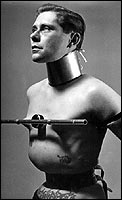 |

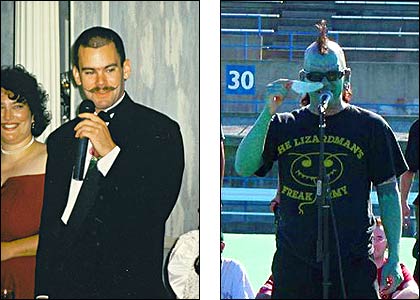











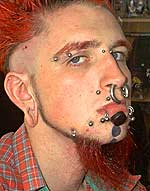
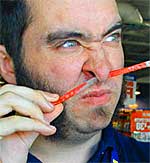









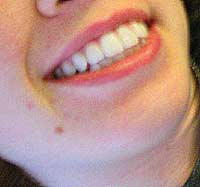


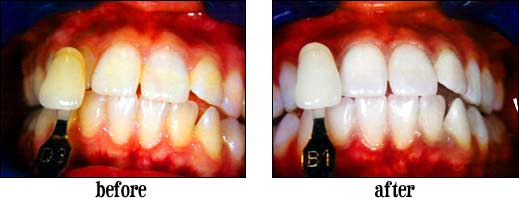

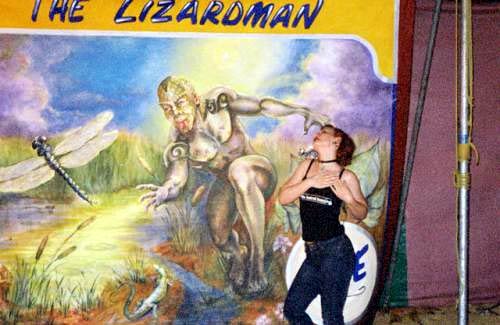






 Judaism has a long history of distaste for tattoos and piercings. It is my understanding that this stems from the Jewish concept that we are created b’tzelem Elokim (in the image of God) and that our bodies are to be viewed as a precious gift on loan from God, entrusted into our care, but not our personal property to do with as we choose. This distaste grew stronger with the Holocaust and the tattooing that was forced upon the Jews in the prison camps.
Judaism has a long history of distaste for tattoos and piercings. It is my understanding that this stems from the Jewish concept that we are created b’tzelem Elokim (in the image of God) and that our bodies are to be viewed as a precious gift on loan from God, entrusted into our care, but not our personal property to do with as we choose. This distaste grew stronger with the Holocaust and the tattooing that was forced upon the Jews in the prison camps. It is not prohibited to bury someone who has tattoos or body piercings in a Jewish cemetery. Although the Torah is interpreted by some to prohibit making a permanent tattoo on one’s body, those who violate this prohibition may still be buried in a Jewish cemetery and participate fully in all synagogue ritual.
It is not prohibited to bury someone who has tattoos or body piercings in a Jewish cemetery. Although the Torah is interpreted by some to prohibit making a permanent tattoo on one’s body, those who violate this prohibition may still be buried in a Jewish cemetery and participate fully in all synagogue ritual. “After an unfortunate tragedy where a close modified friend of mine committed suicide, his family was allowed to bury him in an orthodox Jewish cemetery. He was practically fully suited in tattoos and wore three earrings in each earlobe. At the funeral service I spoke at length with the orthodox rabbi who was performing the service about Jews and body modification. He told me that these misconceptions were not only outdated, but any Jew who believed in them was not following the ways of God. Jews are a very accepting and understanding people. Who are we to judge one for intentionally changing one’s body to fulfill their own desires?”
“After an unfortunate tragedy where a close modified friend of mine committed suicide, his family was allowed to bury him in an orthodox Jewish cemetery. He was practically fully suited in tattoos and wore three earrings in each earlobe. At the funeral service I spoke at length with the orthodox rabbi who was performing the service about Jews and body modification. He told me that these misconceptions were not only outdated, but any Jew who believed in them was not following the ways of God. Jews are a very accepting and understanding people. Who are we to judge one for intentionally changing one’s body to fulfill their own desires?” Deliberate, permanent disfigurement of the body would be prohibited. But such practices as ear piercing and cosmetic surgery (such as elective rhinoplasty) are not prohibited. The purpose of cosmetic surgery is to make the body more beautiful, not to disfigure it. (from
Deliberate, permanent disfigurement of the body would be prohibited. But such practices as ear piercing and cosmetic surgery (such as elective rhinoplasty) are not prohibited. The purpose of cosmetic surgery is to make the body more beautiful, not to disfigure it. (from  What puzzles and disturbs me is the quote from a rabbi stating that such practices as ear piercing and plastic surgery(1) are not prohibited because they are meant to beautify and not to disfigure. Who is to say that the purpose of my body modifications are not to make the body more beautiful? Is this for a rabbi to decide? I believe that the decision of what makes my body more beautiful is my own. Why is plastic surgery regarded as acceptable and other forms of body modification are not? What about circumcision which is a permanent modification? Who makes those decisions?
What puzzles and disturbs me is the quote from a rabbi stating that such practices as ear piercing and plastic surgery(1) are not prohibited because they are meant to beautify and not to disfigure. Who is to say that the purpose of my body modifications are not to make the body more beautiful? Is this for a rabbi to decide? I believe that the decision of what makes my body more beautiful is my own. Why is plastic surgery regarded as acceptable and other forms of body modification are not? What about circumcision which is a permanent modification? Who makes those decisions? Circumcision is also becoming a challenged ritual within Judaism as more and more Jews regard this practice as a social choice. This is a major body modification and disfigurement to a small child that is not given the choice to modify. It is also common practice among non-Jews to circumcise a male newborn penis, and this practice is not specifically Jewish, though it is common practice among Jews specifically. For more information on the complex issue regarding facts and myths of Jewish ritual circumcision, I invite you to visit
Circumcision is also becoming a challenged ritual within Judaism as more and more Jews regard this practice as a social choice. This is a major body modification and disfigurement to a small child that is not given the choice to modify. It is also common practice among non-Jews to circumcise a male newborn penis, and this practice is not specifically Jewish, though it is common practice among Jews specifically. For more information on the complex issue regarding facts and myths of Jewish ritual circumcision, I invite you to visit  For many people, conscious modification has become a way for them to take ownership of the beauty of their own bodies. For a very long time I felt uncomfortable in my own body. I was too fat, too short, my breasts were droopy — I could come up with a list a mile long. I discovered through modification that I loved my own body more when I got to choose what was happening to it. I would not knowingly disfigure my body. I intend to beautify it at my discretion. I am not the only one and I am far from the only modified Jew. By choosing to tattoo my body, I also feel that I am reclaiming this ritual for beauty rather than the hate and disrespect that was the intent of the Nazis forcibly tattooing the Jews during the holocaust.
For many people, conscious modification has become a way for them to take ownership of the beauty of their own bodies. For a very long time I felt uncomfortable in my own body. I was too fat, too short, my breasts were droopy — I could come up with a list a mile long. I discovered through modification that I loved my own body more when I got to choose what was happening to it. I would not knowingly disfigure my body. I intend to beautify it at my discretion. I am not the only one and I am far from the only modified Jew. By choosing to tattoo my body, I also feel that I am reclaiming this ritual for beauty rather than the hate and disrespect that was the intent of the Nazis forcibly tattooing the Jews during the holocaust. My Judaism and my body modification go hand in hand for me. They are both part of who I am and how I represent myself. I am a tattooed Jew. I am proud of both of these facets of my life. I am not ashamed to go to Shul and I am not afraid of the questions. What I dislike is the assumption that I am not as good a Jew because of my modifications. I completely disagree. What I dislike is the prejudice my own Jewish people bestow upon me, and others, for choosing to reclaim the ancient art of body modification. This in itself does not convey the Judaism of acceptance that has always been expressed to me in Shul. I believe this inter-judaic prejudice stems from a sociological prejudice thinly veiled by a misunderstood religious excuse.
My Judaism and my body modification go hand in hand for me. They are both part of who I am and how I represent myself. I am a tattooed Jew. I am proud of both of these facets of my life. I am not ashamed to go to Shul and I am not afraid of the questions. What I dislike is the assumption that I am not as good a Jew because of my modifications. I completely disagree. What I dislike is the prejudice my own Jewish people bestow upon me, and others, for choosing to reclaim the ancient art of body modification. This in itself does not convey the Judaism of acceptance that has always been expressed to me in Shul. I believe this inter-judaic prejudice stems from a sociological prejudice thinly veiled by a misunderstood religious excuse. My family ignores it. Don’t ask, don’t tell — sound familiar? — but still love and respect me as who I am. My family’s beliefs are those of conservative Jews and I respect them for that. However, I follow more of a Reconstructionist view. Reconstructionists define Judaism as the evolving religious civilization of the Jewish people and most Jewish people, including Reconstructionists, no longer accept its binding authority. While Reconstructionists are lovers of tradition and support community celebration of the Jewish sacred year and life-cycle events, we also believe that the face of the Jewish community is changing and that individuals have the right to adapt Jewish tradition to new circumstances. That doesn’t make us any less Jewish than those who live by Conservative or Orthodox law (although there would be plenty of argument within Judaism about this).
My family ignores it. Don’t ask, don’t tell — sound familiar? — but still love and respect me as who I am. My family’s beliefs are those of conservative Jews and I respect them for that. However, I follow more of a Reconstructionist view. Reconstructionists define Judaism as the evolving religious civilization of the Jewish people and most Jewish people, including Reconstructionists, no longer accept its binding authority. While Reconstructionists are lovers of tradition and support community celebration of the Jewish sacred year and life-cycle events, we also believe that the face of the Jewish community is changing and that individuals have the right to adapt Jewish tradition to new circumstances. That doesn’t make us any less Jewish than those who live by Conservative or Orthodox law (although there would be plenty of argument within Judaism about this). I think that the belief that body modification is prohibited by the Torah is antiquated, just as other Biblical laws are (and have thus been adjusted to fit modern times). Judaism is evolving in some sects; no longer do we have to hide what may be seen as “against the Torah” to practice our faith. It is quite a relief to do so. If you choose to practice your faith, there are many ways to do so. When you are dealing with Orthodox, Reform, Reconstructionist and Conservative movements, we will not agree on each others interpretation of the Torah.
I think that the belief that body modification is prohibited by the Torah is antiquated, just as other Biblical laws are (and have thus been adjusted to fit modern times). Judaism is evolving in some sects; no longer do we have to hide what may be seen as “against the Torah” to practice our faith. It is quite a relief to do so. If you choose to practice your faith, there are many ways to do so. When you are dealing with Orthodox, Reform, Reconstructionist and Conservative movements, we will not agree on each others interpretation of the Torah. Body Modification is just as much a part of my life as my faith in Judaism. I believe that my modifications beautify my body and bring joy to my life. They do not take away from my faith in God. My personal practice allows me to be who I am, and I wouldn’t have it any other way.
Body Modification is just as much a part of my life as my faith in Judaism. I believe that my modifications beautify my body and bring joy to my life. They do not take away from my faith in God. My personal practice allows me to be who I am, and I wouldn’t have it any other way. Liz Polay-Wettengel (iam:TattooedRedhead) is an executive general manager in Boston Massachusetts where she lives with her husband and two cats. She has a professional background in the music business and writes for several online blogs. Liz has been an active member of the IAM BME community since 2000 and currently runs the membership sponsorship forum and the
Liz Polay-Wettengel (iam:TattooedRedhead) is an executive general manager in Boston Massachusetts where she lives with her husband and two cats. She has a professional background in the music business and writes for several online blogs. Liz has been an active member of the IAM BME community since 2000 and currently runs the membership sponsorship forum and the 